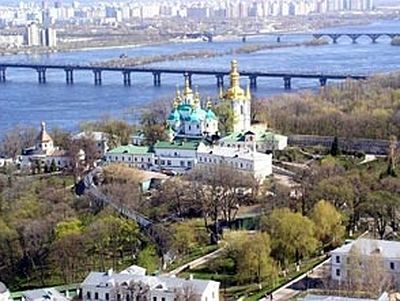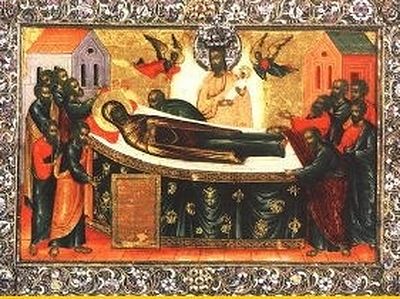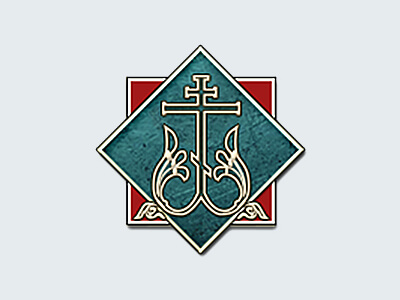
Theodosius, whose name means "gift of God," grew up in the small cities of Vasilkov and Kursk where his father was a judge. Although his parents were Christian and gave him an education directed primarily at the study of Scripture, they were astonished to see his heart so completely overtaken by love for God.
His father died when Theodosius was 13, and this caused the boy to retreat still further from the world common to one of his age and social rank. He gave away his good clothes, preferring to dress like the poor, and found pleasure in helping the peasants with their work. He often went to church, and when he learned that Divine Liturgy was sometimes not celebrated due to a lack of prosphora, he undertook to bake them himself. His mother loved him dearly, but she did not share her son's life-encompassing Christian outlook; she was very conscious of her social standing and felt that by engaging in such lowly occupations Theodosius brought shame upon the family. She tried cajoling, then threatening and even physically beating him to make him change his ways, but Theodosius stood firmly on the path of the Gospel commandments.
His zeal for the things of God inspired Theodosius to slip away with a band of pilgrims bound for the Holy Land. Three days later his mother tracked him down, berated the pilgrims for having taken the boy along, and dragged Theodosius home where she kept him in chains until the youth promised not to leave her again.
The humility of the youth and the sufferings he endured at the hands of his mother came to the attention of the governor who requested that the youth attend him in church. This served to calm the domestic drama, but Theodosius' heart yearned for a more concentrated spiritual atmosphere, for monastic life. Standing in church one day, he was struck by the words of the Gospel: "He who loves father or mother more than Me is not worthy of Me." With fixed resolve, he took advantage of his mother's departure into the country for a few days to set out for Kiev, taking with him nothing but some bread for the road. The monks in the established monasteries, however, turned him away because he had no money. Then he heard about the righteous Anthony. Coming to his cave, Theodosius fell to his knees and begged the holy ascetic to accept him.
"My son," said Anthony, "you see my cave; it is cramped and dismal, and I fear you will not endure the difficulties of life here." "Know, O blessed father," replied Theodosius. "that God Himself has led me to your holiness that I might find salvation. I shall do all that you enjoin." Foreseeing his future greatness, the blessed Anthony accepted the determined aspirant and bade the priest monk Nikon tonsure him. Theodosius was 23 years old.
It was a few years before his distraught mother finally discovered her son’s whereabouts. With great reluctance Theodosius went out to her. At first she vowed that she would die if he did not come home with her. But gradually God softened her heart and she came to see the wisdom of her son's patient admonitions. Following his advice she entered the St. Nicholas convent there in Kiev where she ended her days in peace.
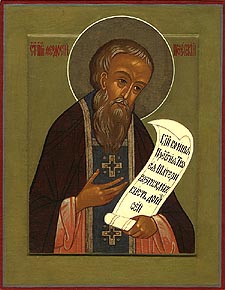
Above all things, have fervent charity among yourselves (I Peter 4:8).
It was St, Theodosius' choice of the Studite Rule, with its emphasis on the duty of charity and the common good, which served to revive the ancient ideal of strict cenobitism and gave Russian monasticism its characteristic warmth. "What is principally necessary," taught Theodosius, "is that the youngest should love their neighbor and listen to their elders with humility and obedience. The elders should lavish on the young love and instruction; they should teach them and comfort them." This attitude created an atmosphere eminently suitable for missionary work, and it was thanks to the monasteries that Christianity was so successfully propagated in Russia.
Of a strong constitution, Theodosius was a model of industriousness. Even as abbot, he felled trees, carried water, and ground wheat, often helping the other brethren with their obediences. Once, the cook came to ask if he would assign a monk to cut firewood, as the kitchen supply was depleted. "I am idle," replied the Saint, and he set to chopping wood himself. He worked through the dinner hour and the brethren, when they came out and saw their abbot hard at work, were inspired to do likewise.
Knowing the great benefit of good books upon the soul, Theodosius instituted the reading of spiritually profitable texts during meals, and sought to augment the number of such books in the monastery. Books were still a rarity at that time, and one of the valued occupations of the monastery was the copying and binding of manuscripts. Theodosius himself helped in this work.
At first, life in the Caves Monastery was very austere indeed. The monks lived principally on rye bread and water with the addition of a few vegetables which they cultivated themselves; they wove their own cloth and sewed their own garments. When the brethren murmured about some deficiency, Theodosius exhorted them to place their trust in the Lord Who knew their needs. And his faith was often miraculously rewarded.
The reputation of the monks as 'angels on earth' began attracting pilgrims; princes and peasants ca me for spiritual counsel and left donations. Grand Prince Izyaslav, who became very attached to St. Theodosius and frequently came to visit him, was a great benefactor of the monastery, as also was the Viking Prince Shimon who was baptized into the Orthodox Church together with his entire household, numbering some 3,000 members.
With increased mean s, Theodosius was able to build a guest house for pilgrims where the poor and sick also found refuge. No beggar was ever turned away from the monastery without being given a meal. Weekly a cart was sent from the monastery laden with bread to be distributed among those in prison.
The Saint's compassion was boundless. Once there were brought to him some robbers who had been apprehended in the act of stealing monastery property. With tears the Saint entreated them to mend their ways. Then, having fed them, he let them go. The robbers were so moved by the Saint's mercy that they repented and became honest, God-fearing men.
Like St. Anthony, Theodosius also endured the effects of the princes' quarrels. At the same time he maintained his independence and did not fear risking the displeasure of his royal benefactors if he felt called as a spiritual father to admonish them. When, for example, Svyatoslav unjustly took the throne from Izyaslav, the Saint wrote a strong letter to Svyatoslav, reproving his action and urging him to restore power to his older brother. This angered Svyatoslav, and Theodosius was warned of possible consequences, but he calmly replied: "Nothing could be better for me in this life than to suffer for the sake of the truth." Mindful of the Saint' s popularity, Svyatoslav took no action against him and even went to visit him. He was surprised when Theodosius received him with the respect due to one of authority. "I was afraid you'd be angry with me," said the Prince. "Our duty," replied the Saint, "is to say what is beneficial for the soul's salvation; and you would do well to listen." Although Svyatoslav could not be persuaded to give up the throne and Theodosius continued to commemorate the pious Izyaslav as the lawful ruler, their relationship was peaceful and it was Svyatoslav who gave land for the building of the new stone church.
Work had just begun on this church when St. Anthony reposed. Neither did St. Theodosius live to see its completion. It was his custom to retire to a cave for the course of Great Lent, and it was during this time, in 1074, that the Lord revealed to him his imminent departure from this world. On Bright Week, having joyfully celebrated the radiant feast of Pascha in the monastery, he fell ill. Summoning the brethren, he informed them that his time had come, and foretold the very day and hour of his repose. By common consent of the brotherhood, he blessed his disciple Stefan to take his place as abbot, exhorting him not to change the tradition s of the monastery, "but follow in all things the law and our monastic rifle."
May 3,1074. The divinely appointed hour arrived and the bright soul of the Saint took leave of its earthly tabernacle. As he had willed, his body was laid to rest in the cave which alone with the angels had witnessed his ascetic labors.
Eighteen years after the Saint's blessed repose, the monastery brethren decided to transfer his relics to the new cathedral church. The abbot, together with monk Nestor the chronicler, went to the cave to dig up the relics and discovered them to be incorrupt. Accompanied by a large crowd of people, the relics were solemnly transferred to the Dormition Cathedral on August 14, 1092. And in 1106 Saint Theodosius was added to the list of canonized saints.
True to their promise, the holy founders of the Caves Monastery continued to watch over its existence even after their repose. There is, for example, the story written by Bishop Simon (+1226), a former monk of that monastery and principal author of the Kiev Caves Patericorn of how the stone church was completed.
Sts. Anthony and Theodosius had been gone from this world some ten years when a group of Greek iconographers came to the Caves Lavra demanding to see the two monks who had hired them to adorn the new church with frescoes. They were rather angry inasmuch as the church standing before them was considerably larger than they had been led to believe and would consequently require more work than was covered by the sum of gold they had received there in Constantinople upon signing the agreement. Abbot Nikon, confessing his ignorance of the matter, asked who it was that had hired them. "Their names were Anthony and Theodosius," "Truly," said the abbot, "I cannot summon them, for they departed this life ten years ago. But as you yourselves testify, they continue to care for this monastery even now."
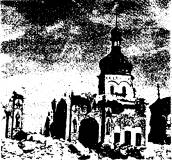
The Dormition Church, rebuilt in 1470, was destroyed in 1941 by an explosion which the Soviets attribute to the Germans. Witnesses, however, state that it was the communists themselves who set delayed action explosives just before the German occupation of the city.

